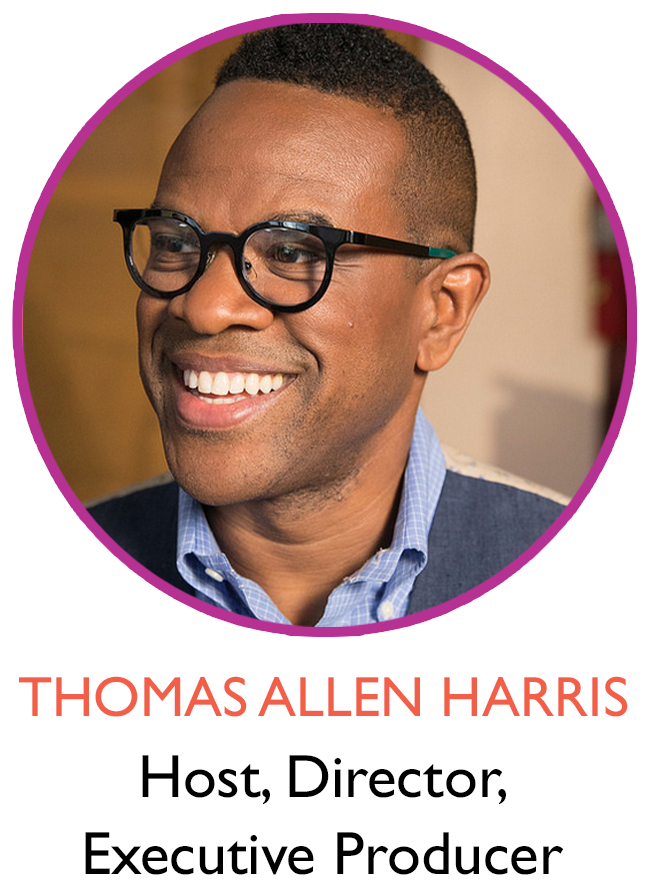Host, Director, Executive Producer

Thomas Allen Harris is a critically acclaimed, interdisciplinary artist who explores family, identity, and spirituality in a participatory practice. Since 1990, Harris has remixed archives from multiple origins throughout his work, challenging hierarchy within historical narratives through the use of pioneering documentary and research methodologies that center vernacular image and collaboration. His television show Family Pictures USA, which takes a radical look at neighborhoods and cities of the United States through the lens of family photographs, collaborative performances, and personal testimony sourced from their communities, premiered on PBS in August, 2019 and was broadcast to 5.3 M viewers and critically well-received.
In 2021, Harris launched the Family Pictures Institute for Inclusive Storytelling to spread the work he has been engaged in over the past 10+ years and expand upon it through robust research, evaluation, scholarly discussion and artistic interpretation. The Institute is funded by The Ford Foundation and others, and will be housed at Yale University.
Harris’ participatory practice grew out of deeply collaborative work he engaged in early in his career with a vanguard of queer filmmakers of color, including Cheryl Dunye, Yvonne Welbon, Raul Ferrera Balanquet, Shari Frilot, and Marlon Riggs. As a staff producer for WNET (New York’s PBS affiliate) on their show THE ELEVENTH HOUR, Harris produced Emmy nominated public television segments around HIV/AIDS activism and its intersection with the culture wars from 1987-1991. In 1990 he curated the first New York/San Francisco Gay and Lesbian Town Hall meeting, a three-hour public television event which culminated in the broadcast of Marlon Riggs’ Tongues Untied. In 1997, Harris and 6 other queer filmmakers of color produced a document titled Narrating Our History: A Dialogue Among Queer Media Artists From the African Diaspora. This piece has been published in Sisters in the Life: A History of Out African American Lesbian Media-Making (2018, ed. Yvonne Welbon and Alexandra Juhasz).
Harris’ deeply personal and experimental films have received critical acclaim at international film/art festivals such as Sundance, Berlin, Toronto, Tribeca, FESPACO, Outfest, Flaherty, Cape Town, and the Melbourne Art Festival, and have broadcast on POV American documentary series on PBS, AfroPOP, the Sundance Channel, ARTE, as well as CBC, Swedish broadcasting Network, and New Zealand Television. The films include: Twelve Disciples of Nelson Mandela (2005), a story of the anti apartheid movement told through personal testimonies, archival material, and a cast of first time South African actors engaging with the archive; É Minha Cara/That’s My Face (2001), a mythopoetic journey shot completely on Super 8mm film by three generations of Harris’ family on three continents; and VINTAGE – Families of Value (1995), a mosaic portrait of Black families created by handing the camera to three groups of queer siblings, including Harris and his brother Lyle Ashton Harris. These films have re-interpreted the idea of documentary, autobiography, and personal archive through their innovative use of community participation.
In 2009, Harris and his team founded Digital Diaspora Family Reunion (DDFR), a transmedia project that explores and shares the rich and revealing narratives found within family photo albums. Working in partnership with museums, festivals, senior and youth centers, educational institutions, libraries, and cultural arts spaces, DDFR organizes workshops, performances, and exhibitions that create communal linkages affirming our common humanity while privileging the voices of people whose stories have often been absent, marginalized or overlooked. The DDFR archive has grown to include 3,500 interviews with people around their family photos and 50K+ photographs. The project was developed in tandem with Harris’ film Through A Lens Darkly: Black Photographers and the Emergence of a People, in which leading Black cultural figures, scholars, and photographers share their archives with Harris in an exploration of the ways photography has been used as a tool of representation and self-representation in history. The film premiered on Independent Lens on PBS in 2015 and was nominated for a National Emmy and a Peabody Award. The film won the 2015 NAACP Image Award for Outstanding Documentary film, the Fund for Santa Barbara Social Justice Award, and an Africa Movie Academy Award, among others.
A graduate of Harvard College, the Whitney Museum of American Arts Independent Study Program, and the CPB/PBS Producers Academy, Harris is a member of the Academy of Motion Pictures Arts and Sciences. His awards include a Guggenheim Fellowship, United States Artist Award, Rockefeller Fellowship, Sundance Director & Producer Fellowships, a Dartmouth College Montgomery Fellowship, and Independent Spirit Award nomination. A published photographer, curator, and writer with a broad background of community organizing in a socially engaged film/art practice, Harris lectures widely on visual literacy and the use of media as a tool for social change and is on faculty at Yale University. His media appearances include C-Span, NPR, Metrofocus, AriseTV, a TEDx Talk, articles detailing his work from Yale Maquette and Truth in Photography, and keynote presentations at Frank Gathering 2020, the North Carolina Network of Grantmakers 2020 Annual Meeting and Conference, and the 2020 Florida Philanthropic Network Statewide Summit on Philanthropy, where the Family Pictures USA methodology is being used to create change in the philanthropic world as well as in leadership training programs.

